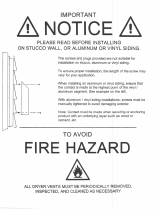
Here is a basic, step-by-step guide to installing a flush fin window.
FLUSH FIN
WINDOW INSTALLATION INSTRUCTIONS
Sealing and Installing the Window
1. For windows with sill adapters:
a. For windows with sill adapters and exterior flanges (Figure 2, Type a):
• Use a pencil line to mark the sill, then apply sealant along the
entire length of the sill to the interior side of the pencil line.
• Trim the sill adapter to adjust for sill variation.
• Align the vertical leg of the sill angle and fasten to the sill with
screws or staples (not provided).
• Install insulation on the sill since the void will not be
accessible once the window is in place.
b. For all other window types, the sill adapter is installed later under
Step 4 of section “Insulating & Finishing”
2. Apply continuous bead of exterior grade sealant along the interior face
of the existing blind stop across the head where the new window frame
will make contact.
3. If head expander is used, install it now (screws not provided).
4. Apply continuous bead of exterior grade sealant 1) along the exterior
face of the existing window frame where the new window frame will
make contact, and 2) along the bottom sill, leaving gaps for the existing
weep holes in the old frame.
5. Insert window from the interior into opening with the sash installed,
closed, and locked.
6. Place shims at the four (4) required screw locations, confirm shimming
and window position, then tighten all four screws, compressing the vinyl
frame against the shims. To prevent jamb bow, DO NOT OVERTIGHTEN.
7. Insert more #8 screws with at least a 1” penetration (may not be included) into all remaining installation holes.
8. Jamb jacks may be used on the jambs at this time if your product is equipped with them.
9. All double hung jambs and sliding windows heads require shims at the meeting rail(s) to prevent frame roll. A fastener
or sealant is recommended to hold the shims in place. Avoid over-shimming which can cause sash binding.
10. Test window operation and adjust installation if necessary.
STEP 3:
Installing and Finishing
1. Insert fiberglass batt insulation between the new frame jambs/head and the old framing. For foam insulation see
precautionary note below.
2. Cover installation holes if covers come with your window model.
3. Install any interior window trim parts (if included).
4. If your window includes a sill adapter (on windows without exterior flanges), the vertical leg may need to be cut to
length based on variation in the original sill. Insert fiberglass batt insulation between the new sill and the old sill.
5. For windows with an exterior accessory groove in the sill, insert the sill adapter tongue into the sill’s exterior
accessory groove and tap into place (see Figure 2, Type b).
6. For windows without an exterior accessory groove in the sill, use an L-shaped sill adapter (see Figure 2, Type c).
Apply a 1/4” min. bead of exterior grade sealant along the full length of the trough on the top edge of the profile.
Slide the adapter with batt insulation underneath up along the sloped sill until the adapter’s top is flush against the
new window sill’s bottom, compressing sealant bead up against the sill of the replacement window.
7. From exterior, apply bead of exterior grade sealant at joint between new frame vinyl and old frame wood blind stops
along head and jambs.
8. From exterior, apply bead of exterior grade sealant across sill at joint between sill adapter and old sill, then up the
sides of the sill adapter, meeting the jamb-to-blind-stop sealant bead.
STEP 4:
Type a
Type b Type c
Stucco Exterior
Stucco Exterior
Figure 2
PRECAUTIONARY NOTES
• Any low-expansion foam used should conform to AAMA 812-04 (see manufacturer’s requirements), but any binding or damage of any type
caused by the insulation will not be covered under warranty.
• Do not paint any vinyl part of this window for any reason. Painting vinyl will render null and void all warranties.
• Do not use abrasive cleaners when cleaning vinyl.
• Do not block or seal weep holes.












